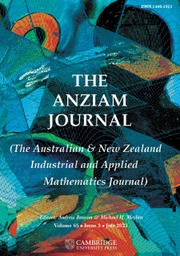Article contents
A gradient technique for an optimal control problem governed by a system of nonlinear first order partial differential equations
Published online by Cambridge University Press: 17 February 2009
Abstract
In this paper a class of optimal control problems with distributed parameters is considered. The governing equations are nonlinear first order partial differential equations that arise in the study of heterogeneous reactors and control of chemical processes. The main focus of the present paper is the mathematical theory underlying the algorithm. A conditional gradient method is used to devise an algorithm for solving such optimal control problems. A formula for the Fréchet derivative of the objective function is obtained, and its properties are studied. A necessary condition for optimality in terms of the Fréchet derivative is presented, and then it is shown that any accumulation point of the sequence of admissible controls generated by the algorithm satisfies this necessary condition for optimality.
Information
- Type
- Research Article
- Information
- Copyright
- Copyright © Australian Mathematical Society 1995
References
- 9
- Cited by

